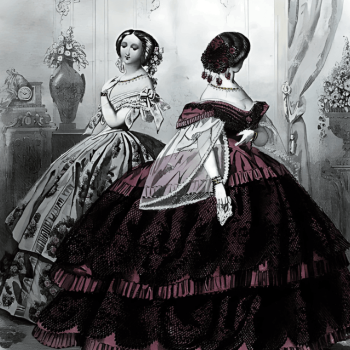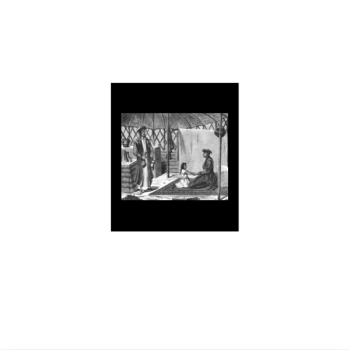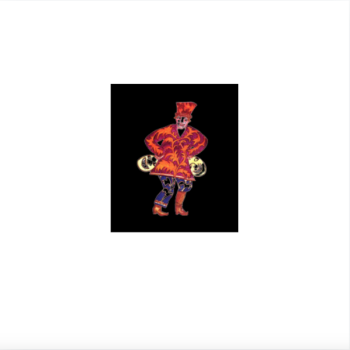THEATRES AND BALLS
November 1840
With winter came short days and frosty nights. Endless evenings by the stoves that enlivened their children’s games and conversations with the cheerful heat and crackling birch firewood. There were sleigh rides on the frozen Volga and endless laughter between lessons in the morning when they were allowed to have snowball fights and ride in a sled around the yard. The grownups no longer participated in these noisy games. There was no greater fun, especially on holidays, when the girls from the orphanage and serf children came to play.
Lelya often went to the theater with the grownups, which Vera was very envious of. Listening to the stories of Aunt Nadya and Lelya, and their endless conversations and laughter at what they saw and heard in the theater, it seemed to her that it must be great fun! Baba Lena and Helena Andreevna assured Vera that she would not understand anything there and would get bored. Vera insisted that this was not true and begged to be taken. When they finally agreed, Vera was very bitterly disappointed. For one thing, the theatre box was nothing but a tiny room without a front wall. It seemed a cramped and awkward ordeal to sit there waiting for the curtain painted with flowers to be raised.
“When will it start?” pestered Vera. “When will the curtain go up?”
“Don’t bother us!” they answered. “Listen to music.”
But Vera did not have fun listening to music. She began to look down, where a lot of men were sitting, and bowed to her acquaintances, and diligently nodded her head to them. No one paid attention or responded to her bows (which offended her very much.) Finally, the curtain rose, and Vera eagerly turned to the stage. There was a forest there, a very nasty one, and thankfully not a real one. In front, on a piece of wood, sat a gentleman in a black calico tunic and a wide black hat with a huge brim, talking to himself about something. Vera listened attentively but did not understand anything. She really wanted to ask her mother what kind of crazy person would talk to himself like that, but she didn’t dare. Suddenly some other gentleman in a red burnous approached him and tapping him on the shoulder, asked: “Old man! Tell me what the life-path is?”[1]
“What is this—life-path?” Vera asked in a whisper, looking at everyone in bewilderment.
Helena Andreevna and Aunt Katya looked at each other, smiling. “Life,” answered Helena Andreevna. “Well, you live, I live! And when we die, our life will end.”
“I know that! But why does he say ‘life-path’? This is a completely different word.”
“No, not something else!” Helena Andreevna and Aunt Katya laughed again.
“What should we do with him? He speaks so badly!”
“Ah! Verka, stop interrupting! Let me listen,” said Aunt Nadya.”
“Well, I told you that she would only get in the way!” added Lelya in a capricious tone.
Vera fell silent and began to listen again, trying, unenthusiastically, to understand what going on. Many more people came onto the stage, everyone was shouting loudly arguing. Vera still could not make out anything, and out of grief she again began to look at her acquaintances in the boxes and stalls. She was very bored and yawned constantly.
“I’m tired!” she said in defeat.
“Sit on my lap,” Helena Andreevna suggested.
“No, no, Helena! You’ll get tired,” said Aunt Katya, “let me take her.”
“No need…I’d rather sit there!” said Vera, pointing to the corner of the box near the door.
“You can’t see anything there!”
“I’m tired of looking,” Vera replied. “This light hurts my eyes.”
Vera sat down on the floor and began to look at the theatre.
“Lelya! Lelya!” she suddenly cried out in surprise. “Look! Our Yakov is sitting up there, under the
ceiling!” She found it extremely surprising and funny to see their butler there, but Lelya and Helena Andreevna turned to her, angrily telling her that she should not speak so loudly in the theater. Vera ended up falling asleep and was sent home wrapped in her mother’s fur coat, with this same butler Yakov, whom she thus prevented from seeing the second act of the tragedy. She never asked to go to the theater again, and for a very long time, she was convinced that nothing interesting happened there and that it was all just a gentleman in a red cloak asking another in a black talma: “Old man! Tell me what the life-path is?”
November 25 was Catterntide, that is, The Feast of Saint Katherine. Since it was the name day of Aunt Katya, they had a lot of guests, with music and dancing. For the first time in Vera’s life, she saw a ball and was terribly glad that she was allowed to sit until midnight (though she really did not like it when men grabbed her and spun her high, assuring her that they were dancing with her.)
“Let me go!” Vera wriggled angrily, “I don’t want to!”
“Why don’t you want to, Verochka? Let’s Dance.”
“What kind of dancing is this? Is this how they dance?”
“Why isn’t this dancing?” they answered, laughing. “How else does one dance?”
“They dance with their feet!” she answered angrily. “But I can’t reach the floor when you spin me around in the air.”
“How angry!” they laughed around her.
Their doctor, Troitsky (not the Frenchman whom they did not like, but another, Russian and very kind) began to persuade her to dance a real gallop with him, but she did not want to.
Lelya danced tirelessly all evening and became very angry when Vera expressed surprise at this.
“What a fool!” Lelya cried. “You think I’m a child? I’m eleven years old, and I’m so tall!”
“You’re not eleven! You’re not even ten yet!”
“In three months, I will be turning eleven!” said Lelya, who turned nine that August. “You should listen to how I talk to the grownups, how much fun I have with my gentlemen. Look, Prince Sergei says that it’s much more fun to dance with me than with older girls!”
“Oh, you braggart,” Vera interrupted.
“Idiot!” Lelya scolded again. “Yes, you should listen to what everyone says about me. I am ‘so smart and funny!’ Look, they’re coming after me!”
Lelya, shaking her head coquettishly, looked at Vera with significant importance and went off to square dance with some officer. Vera noticed that Aunt Nadya, on the contrary, kept walking away and did not want to dance, even though everyone treated her like an adult young lady. She was already thirteen years old, but she did not care for large society balls and dances.[2]
-
- MOTHERS & DAUGHTERS
- A LANTERN
- CHRISTENING OF THE DOLL
- DASHA & DUNYA
- GRUNYA
- NANNY NASTYA
- NANNY’S FAIRYTALE
- CONFESSION
- IN THE MONASTERY
- PREPARATIONS FOR THE HOLIDAY
- EASTER
- THE DACHA
- THE MELON POND
- MIKHAIL IVANOVICH
- THE WARLIKE PARTRIDGE
- LEONID
- NEW WINTER
- HISTORY OF BELYANKA
- THEATRES AND BALLS
- YOLKA
- REASONING
- ROAD
- CAMP
- IN NEW PLACES
- THE GRAY MONK
- VARENIKI
- THE TRIP TO DIKANKA
- WHAT HAPPENED IN THE DOLL HOUSE
- ANTONIA’S STORY
- “A WINTER EVENING”
- THE BLACK SEA
- CRIME AND PUNISHMENT
- PANIKHIDA
- PRINCE TYUMEN
SOURCES:
[1] In Vera’s original text she uses the word “жисть” rather than “жизнь” (life.) The first word means something analogous to “life path” in English and carries notions of fate and destiny. [Sedakova, Irina A. “The Notion Of Fate (Russian Cудьба) In Slavonic Folk Tradition: An Ethnolinguistic Approach.” Cosmos. Vol. XXVIII (2012): 1-17.]
[2] Zhelihovskaya, Vera Petrovna. How I Was Little. A. F. Devrien. St. Petersburg, Russia. (1898): 147-153.













